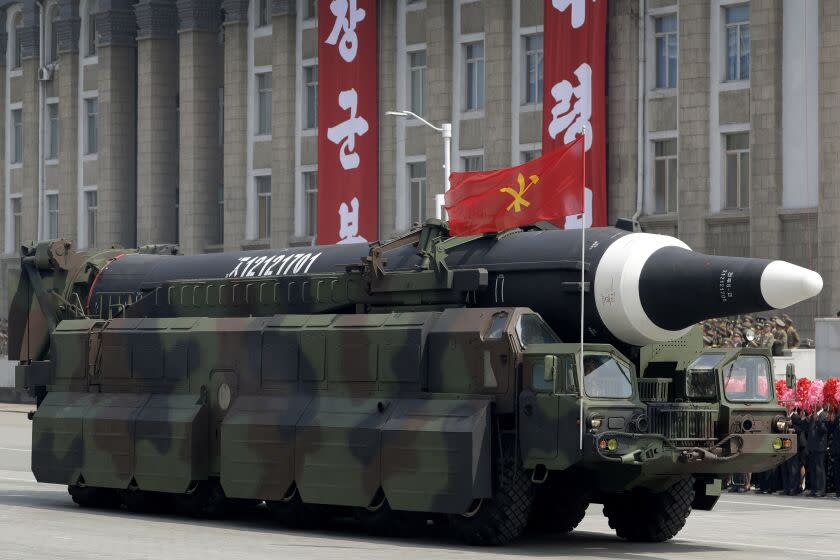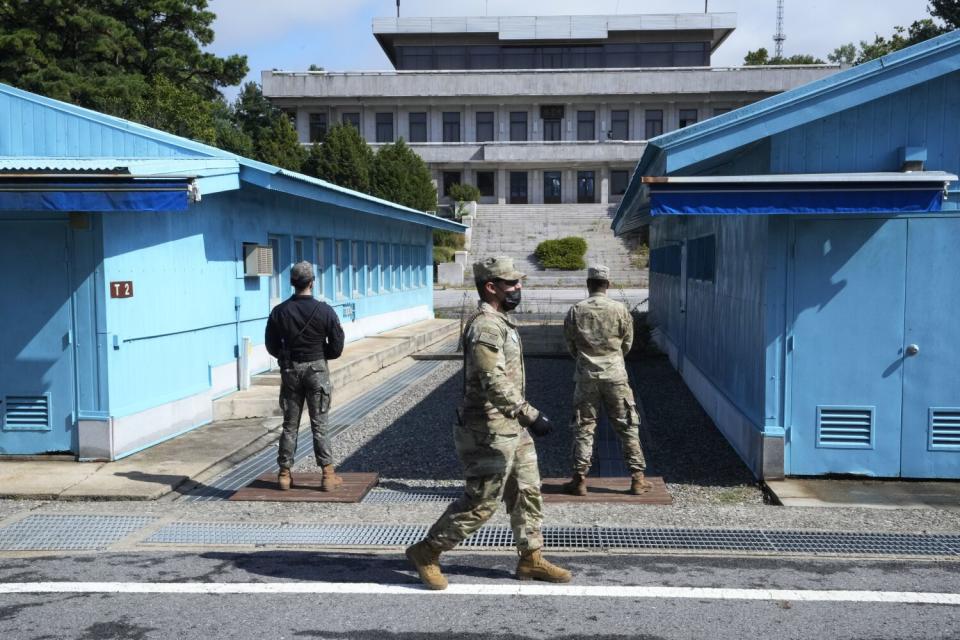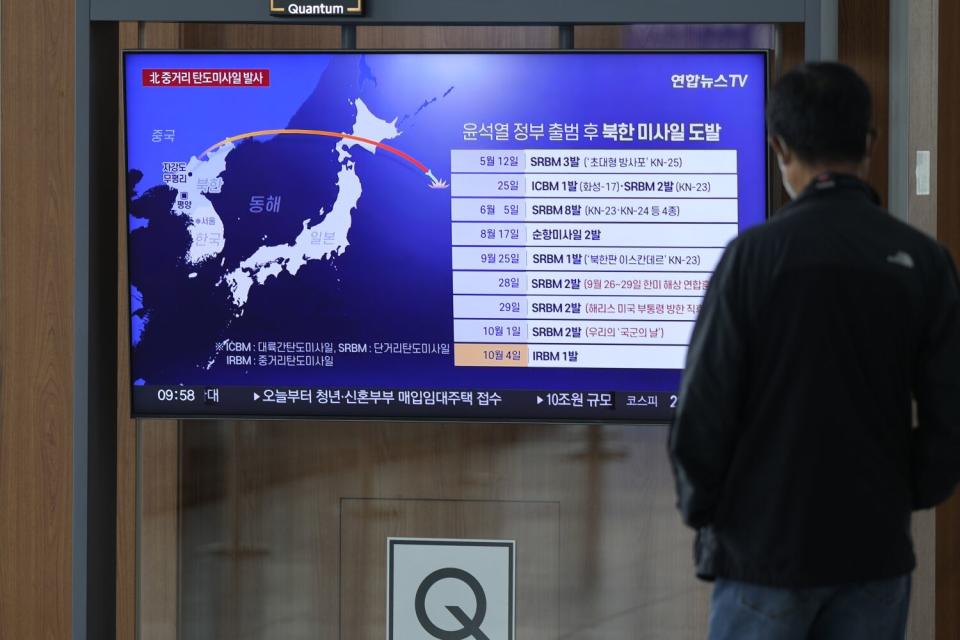North Korea's latest missile test reminds the world of Asia's powder keg

With the war in Ukraine and Russia’s threats to deploy tactical nuclear weapons, it was easy to lose sight of the rising danger North Korea poses to peace in Asia.
But the reclusive state recaptured the world’s attention Tuesday when it launched an intermediate-range ballistic missile over Japan for the first time since 2017, prompting Japanese orders to take shelter across two northern prefectures. The U.S. and South Korea responded by sending warplanes on a bombing drill targeting an uninhabited island in the Yellow Sea, according to South Korea's Yonhap news agency.
The North Korean missile, which landed in the Pacific Ocean, marked the nation's fifth round of weapons tests in 10 days. Its launch came a month after Pyongyang declared itself a nuclear weapons state with the right to make a preemptive strike and amid increasing insecurity for dictator Kim Jong Un.
North Korea’s nuclear weapons program is now more dangerous than ever, a point South Korean and American officials are warning Pyongyang will underline in a few weeks when it conducts its first nuclear test in five years in defiance of United Nations Security Council resolutions.
In a region once defined by trade, the provocations feed a growing disquiet in Asia as geopolitical tensions mount between two blocs: China, Russia and North Korea on one side and the U.S., Japan and South Korea on the other.
At the root of that tension is the challenge posed by China’s growing military strength and its assertiveness on the world stage — which was loudly displayed in August with Chinese war games that virtually blockaded Taiwan to protest House Speaker Nancy Pelosi’s visit to the self-ruled island.
China’s aggressive posture has emboldened North Korea and pushed Tokyo and Seoul deeper under Washington’s security umbrella, analysts say.
Russia has also helped by providing Pyongyang protection from the U.N. Security Council and buying millions of North Korean rockets and artillery shells to replenish depleted stocks after months of fighting in Ukraine, according to a U.S. intelligence finding disclosed last month.
The last two rounds of North Korean missile tests are believed to be in response to Vice President Kamala Harris’ visit to South Korea on Thursday, during which she reaffirmed Washington’s “ironclad” security pledge to its allies in Asia, and anti-submarine drills off the east coast of the Korean peninsula Friday by the U.S., Japanese and South Korean navies.
Those drills follow joint exercises by U.S. and South Korean forces in August, the largest the two countries have held in years and described by Pyongyang as an invasion rehearsal.

The strengthening military ties between the U.S. and its Asian allies come as Kim and his country struggle with deeper international isolation. A summit with former President Trump in 2018 did little to change North Korea's pariah status. Trade with its most important partner, China, was hampered by the pandemic, worsening chronic food shortages.
With his options dwindling, experts say Kim likely took a cue from Russian President Vladimir Putin by trying to use nuclear saber-rattling to gain attention and achieve his goals — namely, recognition as a legitimate nuclear weapons state that should not be under sanction.
Tuesday’s launch fit the bill, said Daniel Sneider, a lecturer in East Asian studies at Stanford University, who noted that the missile used didn’t appear to display any new technical capabilities and was probably designed to raise international alarm.
“It's the North Koreans desperately seeking attention," Sneider said. "They got everybody's attention, didn't they?"
What makes conditions in the region more fraught than in years past is the deteriorating relationship between China and the U.S. Before, Washington could sometimes count on Beijing to rein in Pyongyang. That moderating force is now gone, along with a South Korean government willing to accommodate North Korea for the sake of reducing tensions.
South Korean President Yoon Suk-yeol, having failed to persuade Pyongyang to denuclearize in exchange for help remaking its economy, has rebuked the North's missile tests and warned of a “resolute, overwhelming response” to a nuclear strike.
“The Yoon government refuses to appease Pyongyang and is more willing than its predecessor to increase security cooperation with Washington and Tokyo,” said Leif-Eric Easley, associate professor of international studies at Ewha Womans University in Seoul. “The problem is that China is doing less to restrain and more to enable North Korea while the Kim regime has wrongly convinced itself that nuclear weapons can beat Seoul into submission.”
North Korea possesses between 40 and 50 nuclear warheads, the smallest arsenal of the world’s nine nuclear-armed states, according to the latest data from the Arms Control Assn.
That doesn’t make the country any less dangerous. On Sept. 9, the 74th anniversary of the nation’s founding, Kim announced that North Korea would never give up its nuclear weapons program and had the right to strike first.
North Korea’s increasingly bellicose stance could well have an effect on one of Japan’s most contentious domestic issues: re-militarization.
The sound of air-raid sirens and scenes of people cowering Tuesday as Pyongyang's missile hurtled over Japan likely strengthen the argument for greater defense spending, experts say.
Japan’s feeling of vulnerability has been heightened this year by the invasion of Ukraine by Russia, an uneasy northern neighbor; the assassination in July of former Prime Minister Shinzo Abe, a proponent of re-arming; and China’s military drills around Taiwan, which included landing missiles near Japanese waters.

“Today’s North Korean missile will reinforce the case of those arguing for boosting Japan’s defense capabilities,” said Robert Ward, the Japan chair at the International Institute for Strategic Studies. “A key variable is, of course, public support for such changes. This has recently been rising of late, suggesting growing awareness of the intensity of the security threats to Japan.”
Some experts say the missile was less about intimidating Japan than it was about sending a message to the U.S., which condemned the launch as "dangerous and reckless." The projectile, believed to be a Hwasong-12 that traveled 2,800 miles, could have easily reached the U.S. territory of Guam. Its northern path also suggested a course toward Hawaii.
"Certainly it was a provocative action. Japan didn't like it, but it doesn't mean the aim was Japan," said Narushige Michishita, executive vice president and professor at the National Graduate Institute for Policy Studies in Tokyo.
The flurry of missile launches follows a playbook from 2006, Michishita said, when North Korea used a series of tests to force U.S. officials back to the negotiating table after Washington imposed economic sanctions the previous year.
Similarly, Tuesday's missile launch comes about a month before U.S. midterm elections, which could add pressure on the Biden administration to address North Korea's actions.
“North Korea seems to be basically sending a message that your North Korea policy is failing,” Michishita said, ”and if you want to avoid criticism or further deterioration, you have to start thinking about alternative policy.”
Pierson reported from Singapore and Yang from Taipei, Taiwan.
This story originally appeared in Los Angeles Times.

